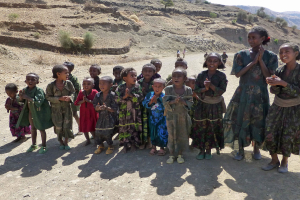
File photo of schoolchildren and their teachers singing by the side of the road in Tigray. Photo credit: Ji-Elle
File photo of schoolchildren and their teachers singing by the side of the road in Tigray. Photo credit: Ji-Elle
Addis Ababa/New York: The situation across Tigray region of Ethiopia continues to be extremely alarming and the United Nations humanitarian workers report that it is deteriorating rapidly. While humanitarian access continues to be restricted due to insecurity and bureaucratic obstacles, preventing aid workers to help people affected by the conflict, the humanitarian response remains drastically inadequate compared to what is needed.
“Our partners are preparing to prevent and assist survivors of gender-based violence across the Amhara and Tigray regions…We continue to engage and call on the Government for immediate, safe, and unimpeded access [of] humanitarian personnel and supplies throughout Tigray,” Stéphane Dujarric, Spokesman for the UN Secretary-General, said in New York.
The UN and NGOs (non-governmental organisations) have nearly 80 humanitarian workers in Addis Ababa who are ready to travel to Tigray pending clearance, and the clearance has now been pending for more than one month. More than 20 trucks have been positioned to move food supplies into Tigray. Some 120,000 people — that’s fewer than one third of the nearly 500,000 people have regular access to water. There were reports about lack of food in markets due to fighting having broken out during harvest season, which left crops unharvested. This further compounds the problems as even before the conflict, malnutrition was already on the rise because of the pandemic and desert locusts there.
Also read:
- US reverses Trump’s stand on embattled Tigray region of Ethiopia
- Situation stable after days of violence in Ethiopia and Niger but the vicious cycle of poverty, fragility and conflict still devastating ‘fragile states’
In spite of the challenges though, some urgent assistance could be provided and two refugee camps in the southern part of Tigray, Mai-Ayni and Adi-Harush, were now receiving regular food allocations, with food delivery and distributions for the month of January having been completed. Across the region, 250,000 people have been reached with two months’ worth of food. Medical supplies have also been procured and dispatched to help hundreds of thousands of people.
“Although we managed to increase our operations, they are still limited to helping people living in the towns along the main roads from the capital, Mekelle, towards Shire, and two refugee camps,” Dujarric said.
While hundreds of thousands of people still not receiving aid, economic activity, electricity, communications and basic services remain largely disrupted, especially in rural areas, where two thirds of the population live. Banks remain closed, except in Tigray’s capital, Mekelle and this is hindering aid organisations and others from providing basic services.
The World Health Organization (WHO) believes that nearly 80 per cent of the hospitals remain unfunctional in the region. Moreover, nearly 1.3 million children have been out of school since the beginning of the conflict. Many schools are now sheltering internally displaced people (IDPs). There are reports of children having been separated from families, as well as forced recruitment, and serious allegations of sexual and gender-based violence.
“The continuing conflict and administrative bureaucracy are still making it difficult to scale up humanitarian assistance. We continue to call for full, immediate, safe, and unimpeded humanitarian access to provide urgent assistance and protection to those in need. We are encouraged that recent high-level visits have resulted in productive exchanges with Ethiopian authorities, who understand the potential for greater risk,” Dujarric said.
On February 2, 2021, the UN had also issued a statement from the Secretary-General António Guterres, saying he remains seriously concerned over the situation in Tigray. Guterres has however welcomed the positive engagement of the Ethiopian Government during the recent visits by senior UN officials including the High Commissioner for Refugees, Filippo Grandi, the head of UN Safety and Security, Gilles Michaud, as well as the Executive Director of the World Food Programme (WFP). These engagements were undertaken in line with the Secretary-General’s call to the Government for sustained, impartial and unimpeded humanitarian access to affected areas in the Tigray region and to internally displaced persons and refugee camps.
However, as very little is being allowed in Tigray region, Dujarric had said what the UN needed was to be able to just get in there “in an unfettered manner without having to negotiate for every truck, for every box”. He had stressed that the UN worked work cooperatively with the Government – “…it’s their country, we have to go through them, and that’s the way it should be. But, there is a grave humanitarian need in Tigray, and at this point, we’re not able to reach the people that need to be reached”. Ray, and then we’ll go to Mr. Sato on the screen.
– global bihari bureau






My brother recommendded I might like this website.
He was entirely right. This post truly made my day. You can not imagine simply how much time I spent for
this information! Thanks!